

Schizotypal Personality Disorder. The Human Mind Schizotypal Personality Disorder Schizotypal Personality Disorder is a pervasive pattern of social and interpersonal deficits marked by acute discomfort with, and reduced capacity for, close relationships as well as by cognitive or perceptual distortions and eccentricities of behavior, beginning by early adulthood and present in a variety of contexts, as indicated by five (or more) of the following: The disorder does not occur exclusively during the course of Schizophrenia, a Mood Disorder With Psychotic Features, another Psychotic Disorder, or a Pervasive Developmental Disorder.
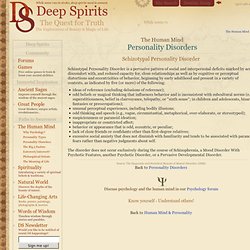
Schizoid Personality Disorder. The Human Mind Schizoid Personality Disorder Schizoid Personality Disorder is a pervasive pattern of detachment from social relationships and a restricted range of expression of emotions in interpersonal settings, beginning by early adulthood and present in a variety of contexts, as indicated by four (or more) of the following: neither desires nor enjoys close relationships, including being part of a family;almost always chooses solitary activities;has little, if any, interest in having sexual experiences with another person;takes pleasure in few, if any, activities;lacks close friends or confidants other than first-degree relatives;appears indifferent to the praise or criticism of others;shows emotional coldness, detachment, or flattened affectivity.
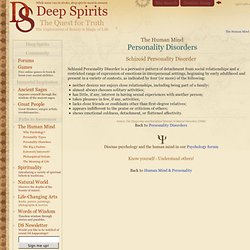
Source: The Diagnostic and Statistical Manual of Mental Disorders (DSM)Back to Personality Disorders Know yourself - Understand others! Sadistic Personality Disorder. The Human Mind Sadistic Personality Disorder Sadistic Personality Disorder is a pervasive pattern of cruel, demeaning, and aggressive behavior, beginning by early adulthood, as indicated by the repeated occurrence of at least four of the following: The behavior has not been directed toward only one person (e.g., spouse, one child) and has not been solely for the purpose of sexual arousal (as in Sexual Sadism).
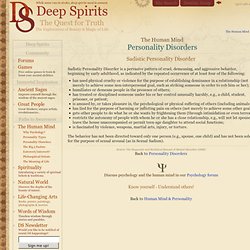
Source: The Diagnostic and Statistical Manual of Mental Disorders (DSM)Back to Personality Disorders Know yourself - Understand others! Back to Human Mind & Personality. Paranoid Personality. The Human Mind Paranoid Personality Disorder Paranoid Personality Disorder is a pervasive distrust and suspiciousness of others such that their motives are interpreted as malevolent, beginning by early adulthood and present in a variety of contexts, as indicated by four (or more) of the following: Source: The Diagnostic and Statistical Manual of Mental Disorders (DSM)Back to Personality Disorders Know yourself - Understand others!
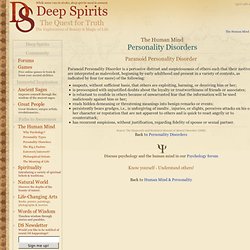
Passive-Aggressive Personality. The Human Mind Passive-Aggressive Personality Disorder Passive-Aggressive Personality Disorder is a pervasive pattern of negativistic attitudes and passive resistance to demands for adequate performance, beginning by early adulthood and present in a variety of contexts, as indicated by four (or more) of the following: passively resists fulfilling routine social and occupational tasks;complains of being misunderstood and unappreciated by others;is sullen and argumentative;unreasonably criticizes and scorns authority;expresses envy and resentment toward those apparently more fortunate;voices exaggerated and persistent complaints of personal misfortune;alternates between hostile defiance and contrition.
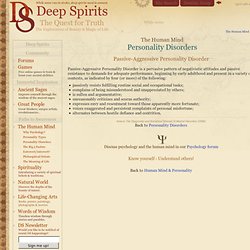
Source: The Diagnostic and Statistical Manual of Mental Disorders (DSM)Back to Personality Disorders Know yourself - Understand others! Obsessive-Compulsive Personality. The Human Mind.
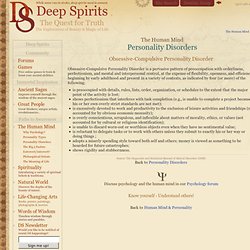
Narcissistic Personality. The Human Mind.

Masochistic Personality. The Human Mind Masochistic (Self-defeating) Personality Disorder Self-defeating Personality Disorder is a pervasive pattern of self-defeating behavior, beginning by early adulthood and present in a variety of contexts.
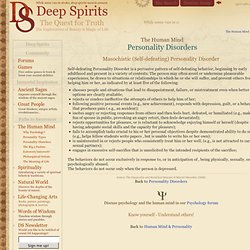
The person may often avoid or undermine pleasurable experiences, be drawn to situations or relationships in which he or she will suffer, and prevent others from helping him or her, as indicated by at least five of the following: The behaviors do not occur exclusively in response to, or in anticipation of , being physically, sexually, or psychologically abused. The behaviors do not occur only when the person is depressed.
Source: The Diagnostic and Statistical Manual of Mental Disorders (DSM)Back to Personality Disorders Know yourself - Understand others! Back to Human Mind & Personality. Histrionic Personality. The Human Mind Histrionic Personality Disorder Histrionic Personality Disorder is a pervasive pattern of excessive emotionality and attention seeking, beginning by early adulthood and present in a variety of contexts, as indicated by five (or more) of the following: is uncomfortable in situations in which he or she is not the center of attention;interaction with others is often characterized by inappropriate sexually seductive or provocative behavior;displays rapidly shifting and shallow expressions of emotions;consistently uses physical appearance to draw attention to self;has a style of speech that is excessively impressionistic and lacking in detail;shows self-dramatization, theatricality, and exaggerated expression of emotion;is suggestible, i.e., easily influenced by others or circumstances;considers relationships to be more intimate than they actually are.
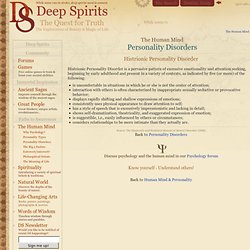
Depressive Personality. The Human Mind.
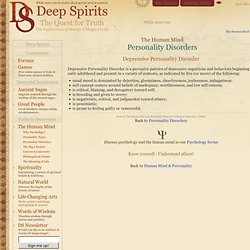
Dependent Personality. The Human Mind Dependent Personality Disorder Dependent Personality Disorder as a pervasive and excessive need to be taken care of that leads to submissive and clinging behavior and fears of separation, beginning by early adulthood and present in a variety of contexts, as indicated by five (or more) of the following: has difficulty making everyday decisions without an excessive amount of advice and reassurance from others; needs others to assume responsibility for most major areas of his or her life; has difficulty expressing disagreement with others because of fear of loss of support or approval; has difficulty initiating projects or doing things on his or her own (because of a lack of self-confidence in judgment or abilities rather than a lack of motivation or energy); goes to excessive lengths to obtain nurturance and support from others to the point of volunteering to do things that are unpleasant;
Borderline Personality. The Human Mind. Avoidant Personality. The Human Mind Avoidant Personality Disorder Avoidant Personality Disorder is a pervasive pattern of social inhibition, feelings of inadequacy, and hypersensitivity to negative evaluation, beginning by early adulthood and present in a variety of contexts, as indicated by four (or more) of the following: avoids occupational activities that involve significant interpersonal contact because of fears of criticism, disapproval, or rejection;is unwilling to get involved with people unless certain of being liked;shows restraint within intimate relationships because of the fear of being shamed or ridiculed;is preoccupied with being criticized or rejected in social situations;is inhibited in new interpersonal situations because of feelings of inadequacy;views self as socially inept, personally unappealing, or inferior to others;is unusually reluctant to take personal risks or to engage in any new activities because they may prove embarrassing.
Know yourself - Understand others! Antisocial Personality. The Human Mind Antisocial Personality Disorder Antisocial Personality Disorder is a pervasive pattern of disregard for and violation of the rights of others occurring since age 15 years, as indicated by three (or more) of the following: failure to conform to social norms with respect to lawful behaviors as indicated by repeatedly performing acts that are grounds for arrest;deceitfulness, as indicated by repeated lying, use of aliases, or conning others for personal profit or pleasure;impulsivity or failure to plan ahead;irritability and aggressiveness, as indicated by repeated physical fights or assaults;reckless disregard for safety of self or others;consistent irresponsibility, as indicated by repeated failure to sustain consistent work behavior or honor financial obligations;lack of remorse, as indicated by being indifferent to or rationalizing having hurt, mistreated, or stolen from another.
Know yourself - Understand others!